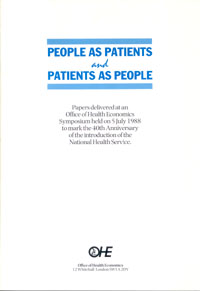Sign up to our newsletter Subscribe
Challenges and Solutions for Budget Impact Analysis of Gene Therapies

Despite much of the current discussion, Britain’s National Health Service has been an outstanding success during its 40 years of existence. Its present problems stem primarily from the way in which the scope for medical care within the service has been extended so…
Despite much of the current discussion, Britain’s National Health Service has been an outstanding success during its 40 years of existence. Its present problems stem primarily from the way in which the scope for medical care within the service has been extended so dramatically since 1948.
In spite of these problems, the NHS has achieved a great deal of what was expected of it by its architects in the 1940s. It has made medical care available to the population as a whole, regardless of the ability to pay. The present serious shortages are often for treatments which were undreamt of in the 1940s – transplants, and heart surgery, for example. Waiting lists are often for treatments which would have been impossible 40 years ago.
The OHE symposium on 5 July 1988 was therefore planned to look positively at the NIIS. It re-emphasised the fact that the NHS was above all conceived to treat individuals. Although community initiatives for the prevention of disease continue to be of vital importance, the great majority of NHS care is for the treatment of individual patients. That is, people as human beings rather than statistics.
No one in the NHS must ever forget that the individual patient is the most important person in the system. This OHE symposium reinforced this central message as theNHS entered its fifth decade. Above all, in this context, it was about the long-term responsibilities of the NHS rather than its immediate problems.
People as Patients and Patients as People
